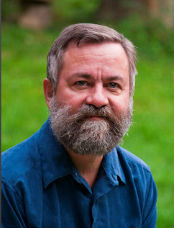Steven Hopp
I teach part-time in the Environmental Studies program at Emory & Henry. The program offers two tracks of study in policy (B.A.) or science (B.S.). The courses I offer serve as supplements to these programs. I teach in the fall semester, taking the spring term off for other family and professional activities. The courses I teach areENVS225: Sustainable Agriculture in Appalachia and ENVS300: Wildlife Monitoring and Management.
My academic research over the past decades has mainly focused on some combination or subset of animal behavior, animal communication, bird natural history and all with a strong interest in the new world family of birds called vireos. In graduate school, I discovered the fascinating interdisciplinary study of animal communication and spent my years there studying hearing mechanisms in primates and how the hearing of different species of primates predisposed them to the use of their vocal signals. The research involved training monkeys to serve as subjects in psychoacoustic studies, and the laboratory conducted studies on questions of basic hearing as well as more focused studies on the role of hearing in vocal communication.
After graduate school I switched my research focus to field studies with birds, focusing on the White-eyed Vireo. While it seems like a huge change from work with primates, in practice those two animal groups (songbirds and non-human primates) are two of the most studied animal groups (for vocal communication) and a lot of the recording technology, theoretical discussion, evolution of communication, physics and computer analysis of sound are the same. I studied White-eyed Vireos in Virginia for ten years, then shifted to similar studies with Bell’s Vireo when I was at the University of Arizona. I published papers on various aspects of their natural history, their vocal communication and got very interested in the evolution of their vocal systems. I am interested in the group of insular species of vireos that inhabit the various greater Antilles Islands, and have conducted research trips to study several species and in particular their interspecific interactions between the endemic species and their migratory counterparts. (…I know, a dirty job but someone has to do it!).
More recently I have become involved in fostering and promoting local food systems. This began as somewhat of an avocation and slowly morphed into more of a vocation. A turning point was a collaborative project with my wife (Barbara Kingsolver) on a book, Animal Vegetable Miracle, about local food systems. The book outlines a year-long attempt by our family to try and eat as close to home as possible. Barbara provides the overarching narrative which gives an opportunity to discuss current issues with conventional food systems in our country. My contributions were multiple side-bars addressing specific issues as they arose in the text. The wide acceptance of that book (it’s now been translated into 9 other languages) started an interest in not only local food systems, but also local economies. I founded the Meadowview Famers’ Guild and Harvest Table Restaurant, where I serve as the director, and continue to work with local and regional projects and programs to promote local economies, including serving on the board of Appalachian Sustainable Development.
Education
In 1978 I received my B.A. with a double-major in Psychology and Biology, and a Minor in Chemistry from Simpson College in Indianola, Iowa. My interdisciplinary interests continued in Graduate school at Indiana University. There I concentrated broadly on Comparative Psychology and in 1985 received my Ph.D. in Experimental Psychology, with a major in animal behavior, and graduate minors in Zoology and Physiological Psychology.
In 1984 I joined the faculty of Emory & Henry College in Emory, Virginia as an Assistant Professor of Psychology. I assumed the duties of departmental chair in 1988, tenured in 1989, and promoted to Associate Professor in 1990. While at Emory and Henry I began field studies with vireos, concentrating on vocal communication, but also collecting a broad array of natural history information. My interest in the vireo family continues, and I have since conducted studies with a wide variety of vireo species.
In 1994 I moved to Tucson, Arizona and began an appointment as an Adjunct Associate Professor in the Department of Ecology and Evolutionary Biology at the University of Arizona. There I continued studies of different vireo species, concentrating in Arizona on Bell’s Vireo. In 1996 I started an affiliation with the Arizona Sonora Desert Museum, and worked as a Research Associate with the ongoing Migratory Pollinators Project. My studies with the museum concentrated on the role of songbirds as pollinators, particularly Lucy’s Warbler and Verdins.
I returned to Emory & Henry in 2004 and have taught as an adjunct in the Environmental Studies program since then.
Open gallery
